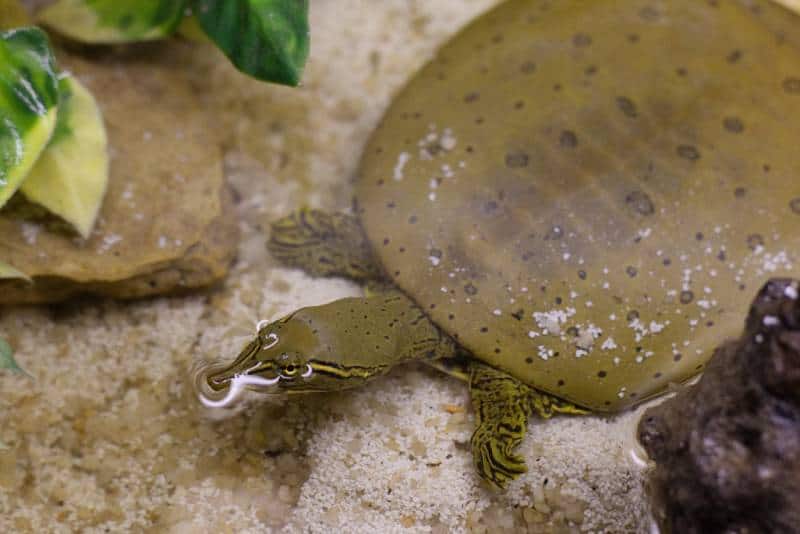There is no mistaking a Spiny Soft-shelled Turtle, …it is often described as being ‘pancake like’ and having a ‘pig snout’!
Spiny Soft-shell Turtles are quite cute and comical as baby turtles. They are also very quick and alert. Many are graceful swimmers. “Watching softshells swim is like watching birds fly!” is an observation by one insightful turtle breeder.
Despite their adorable appearance as babies the Spiny Soft-shell Turtle is a more difficult turtle to keep. Adults need to be housed singly or in small groups. Groups will need a lot of space, as they can grow into large, somewhat aggressive animals.
The Spiny Soft-shell Turtles are best kept as display animals. Even so, you will find that some softshells will be great for this while others will bury themselves in the sand and rarely be seen. It takes a special keeper with a sincere interest to keep soft-shelled turtles properly in captivity.
- For more information see: Selecting and Caring for Your Turtle or Tortoise
Scientific Classification
| Kingdom: | Animalia |
| Phylum: | Chordata |
| Class: | Reptilia |
| Order: | Testudines |
| Family: | Trionychidae |
| Genus: | Apalone |
| Species: | spinifera |
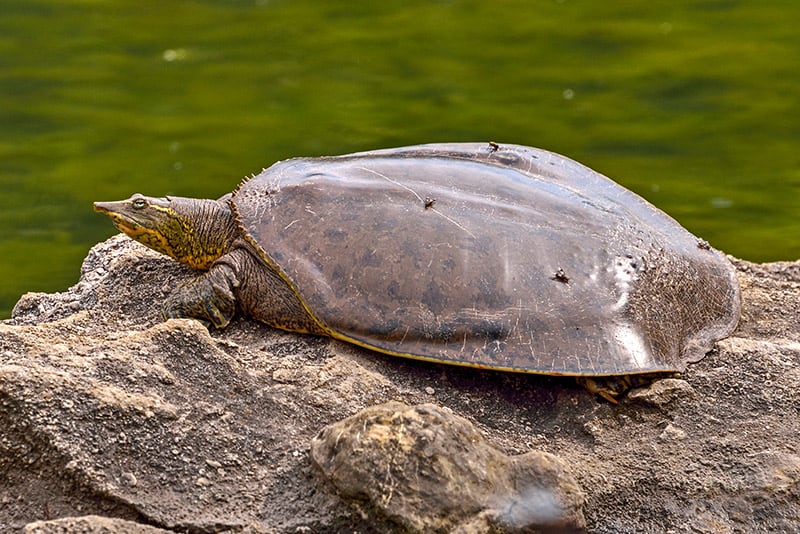
Distribution
The Spiny Soft-shelled Turtle ranges from Canada to Mexico and as far west as California. There are seven subspecies. Many are found living at the bottom of the deep rivers where the water is quite cool, even in hot tropical climates. Many are also found in brackish waters.
Status
These turtles are not listed on the IUCN Red List. They are listed by the Committee on the Status of Endangered Wildlife in Canada (COSEWIC): Threatened.
Description
Spiny Soft-shell Turtles have an upper shell, called the carapace, that is flat, kind of ‘rubbery’, and rounded. Their name comes from small spines on the pliable edges of the carapace. There are no scutes, the scales or plates seen on most turtles, on either the carapace or the lower shell, which is known as the plastron. They have a long tapered nose that turns upward on the end and has ridges. Their feet have claws and are webbed for swimming.
All species of Spiny Soft-shell Turtle have an overall olive or tan coloring. On the upper shell or carapace, they all have black speckles. Most species also have a dark rim around the edge of the carapace, on some species there are a couple dark lines towards the tail end, and some even have whitish spots. The plastron is an offwhite or yellowish color and you can see the turtles bones through it.
Male Spiny Soft-shell Turtles stay the same color when adults as when they were juveniles. They are smaller than females, have a bit rougher carapace, and a longer thicker tail. The female becomes darker as she ages with a grayish mottling to her carapace, and her tail barely extends past the end of her shell. Female Spiny Soft-shell Turtles can grow up to between 12 to 18 3/4″ (30 – 48 cm) while males are considerably smaller.
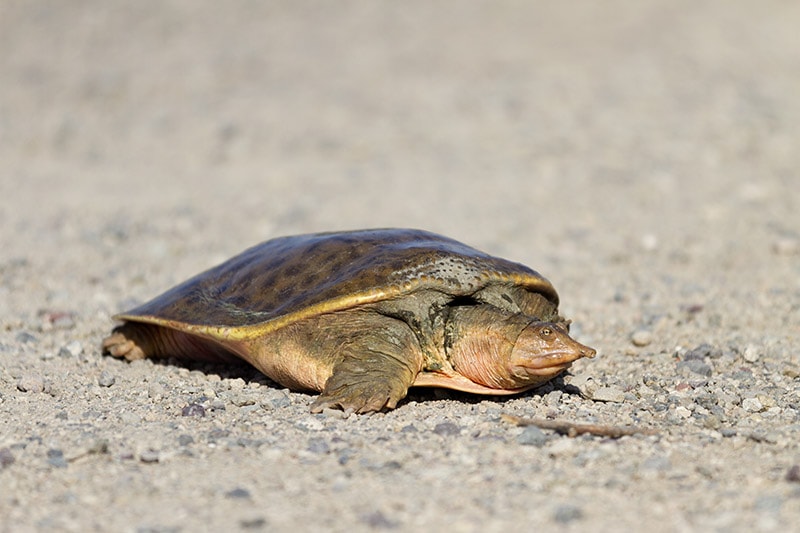
Care and Feeding
Spiny Soft-shell Turtles are carnivores. They feed readily on fish (avoid carp and catfish), worms, crickets, pink mice, crayfish, and shrimp. Once acclimated, most soft-shelled turtles will eagerly accept floating commercial diets. The key to a healthy turtle is a “balanced” diet, so be sure to provide variety.
Environment
Most species of Spiny Soft-shell Turtles will have to be kept individually or in small groups spread out in a large, creatively designed enclosure. If you overcrowd Spiny Soft-shell Turtles, you are asking for trouble.
Provide a large enclosure and don’t be afraid to go overboard on the filtration. Water in the 72{deg} to 75{deg} F (22 to 25{deg} C) range and in the neutral to slightly acidic (6.5 to 7.0) pH range are great for all North American species and most of the exotic species. The addition of live aquatic plants will make the enclosure more interesting and they will also help “acclimate” the water and add oxygen to the system.
Most small to medium specimens of soft-shelled turtles, especially North American species, will bask if given the appropriate area. Sand banks and large fallen trees are used in the wild, but most will crawl onto a piece of driftwood or slate (or even a mat of floating aquatic plants) if these are all that are available. Be careful to build a system that prevents abrasions or injuries to the turtles’ shells.
Many soft-shelled turtle species are found in brackish water in nature. Salt inhibits the growth of fungus and certain bacteria. Therefore, the addition of one teaspoon to one tablespoon of salt per gallon of water can be beneficial to keeping them healthy.
Handling
Both young and older Spiny Soft-shell Turtles should be considered display animals. They are somewhat aggressive, are strong, and will readily bite. Because of this, handling should be kept to a minimum and they will try to get away from a keeper. Their soft shells can also get scratched and these scratches can serve as the attachment point for fungus. Set up a beautiful, large enclosure and enjoy watching your softshells.
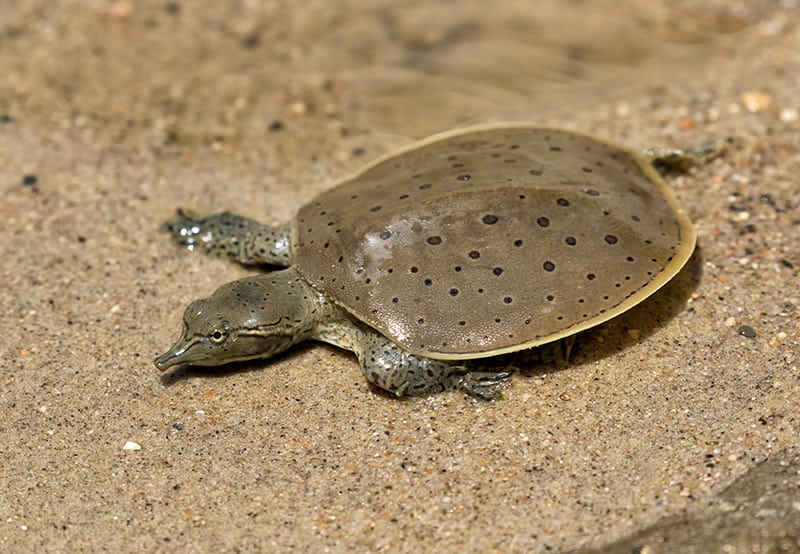
Breeding
The courtship of the Spiny Soft-shell Turtle is elaborate and interesting. It includes waving of large webbed feet, extension of the neck, and head shaking. Breeding is aggressive in most species with lots of neck biting and chasing. If a group is kept together, during this time remove any uninterested females from the enclosure or add more hiding spots and obstacles such as driftwood and large clumps of live plants. A deep substrate can keep aggression to a minimum as the turtles will bury themselves quite deeply to avoid confrontation.
Typically, Spiny Soft-shell Turtle females lay their eggs on sandy beaches or sand bars near the river, stream, or pond in which they live. Thus, most successful breeders offer a sloped, sandy, “pull-out” site in association with their soft-shelled turtle ponds. Some species are more adventurous and are willing to search out a proper egg-laying site even over some distances and obstacles. Others will be more sensitive and if a proper site is not readily available, they will drop their eggs in the water of their enclosure. If the eggs are found soon (most breeders feel within 4-5 hours), and are not damaged or eaten by residents of the pond, they will usually hatch.
| “We once removed from an indoor Guadeloupe River Soft-shelled Turtle (Apalone spinifera guadeloupensis) enclosure four eggs that had been under water for at least four to five hours. We successfully hatched three of them 57 (2) and 58 (1) days later.” …Russ Gurley. |
Hatchling soft-shelled turtles are probably the most sensitive turtles in captivity with regards to their captive care. They can be set up in 20-gallon long aquariums similar to other hatchlings, but they must be offered water of highest quality. This water should be free of chlorine, slightly acidic, filtered, and oxygenated. The addition of one teaspoon (North American species) or up to one tablespoon (others) of aquarium salt per gallon of water can help keep them happy and healthy. They should be kept warm (70{deg} F) by a submersible aquarium heater or an under-tank heater. Add a substrate of clean, washed river sand and add lots of driftwood and live plants to enhance their environment.
Add a variety of small fish such as guppies, platies, and mosquito fish. Feed them live invertebrates such as redworms, earthworms, and black worms once or twice a week. Most species will begin taking a pelleted aquatic turtle food quite soon after acclimating and feeding on live prey. Reptomin® floating sticks are especially appealing to young soft-shelled turtles.
Ailments / Health Problems
Scratches or scrapes can easily become infected if soft-shelled turtles are kept in enclosures with poor water quality. Prepare their cage furnishings carefully and thoughtfully. Use a couple of tablespoons of sea salt or aquarium salt per gallon of water and keep some Acriflavine and Silvadene® cream on hand for emergencies.
Acriflavine: Many tropical fish keepers using Acriflavine suggest treating animals with an accompanying rise in the water temperature. Warm water temperatures in the suggested 85{deg} to 88 F range can be deadly to soft-shelled turtles!
Betadine (iodine) is toxic to some soft-shelled turtles, especially members of the genus Aspideretes. To be safe, do not use iodine-containing products with any soft-shelled turtles.
- Silvadene®: Silvadene® is an antibiotic cream formulated for use with human burn victims. It requires a physician’s prescription, but is an important part of a turtle keeper’s arsenal of tools. It has proven very effective in treating sores and shell problems in both soft-shelled and hard-shelled turtles.
- Salt: Many soft-shelled turtle species are found in brackish water in nature (especially Trionyx and Pelochelys). Salt inhibits the growth of fungus and certain bacteria, so the addition of salt can be beneficial to keeping them healthy.
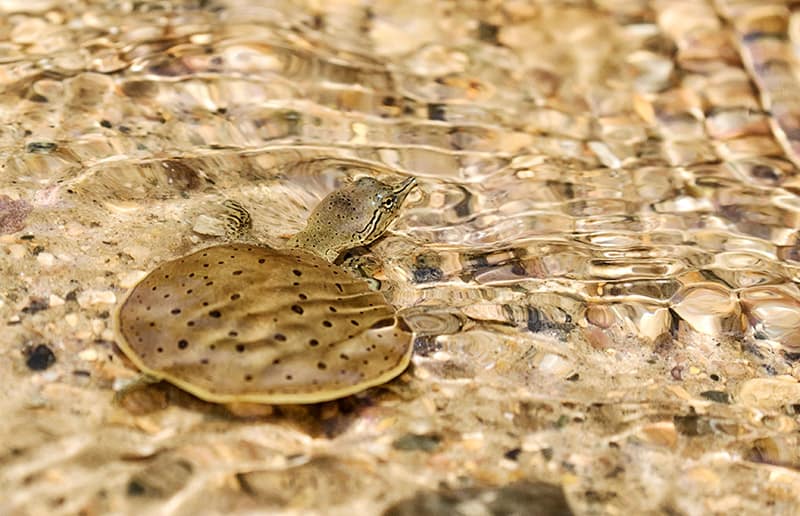
Availability
Spiny Soft-shell Turtles are occasionally available throughout the U.S. in pet stores, at reptile shows, and on-line.
The lack of keepers willing to keep softshells will no doubt keep them rare in collections. The large size attained by many species, the expense of the large enclosure required, the need to keep only one or two specimens per large enclosure, and the requirement for live fish make the task both expensive and daunting.
Featured Image Credit: Mirkwood Photo, Shutterstock
